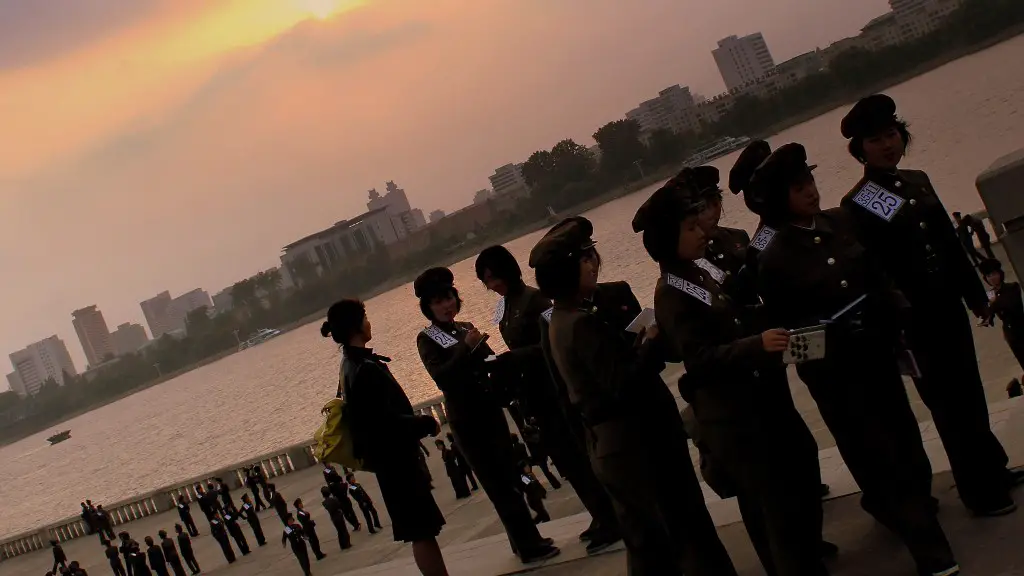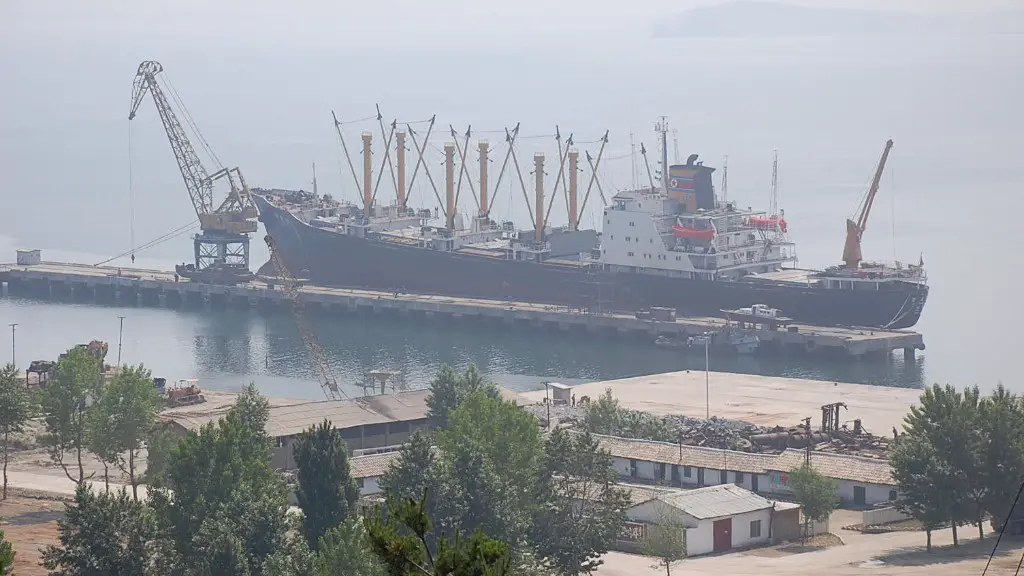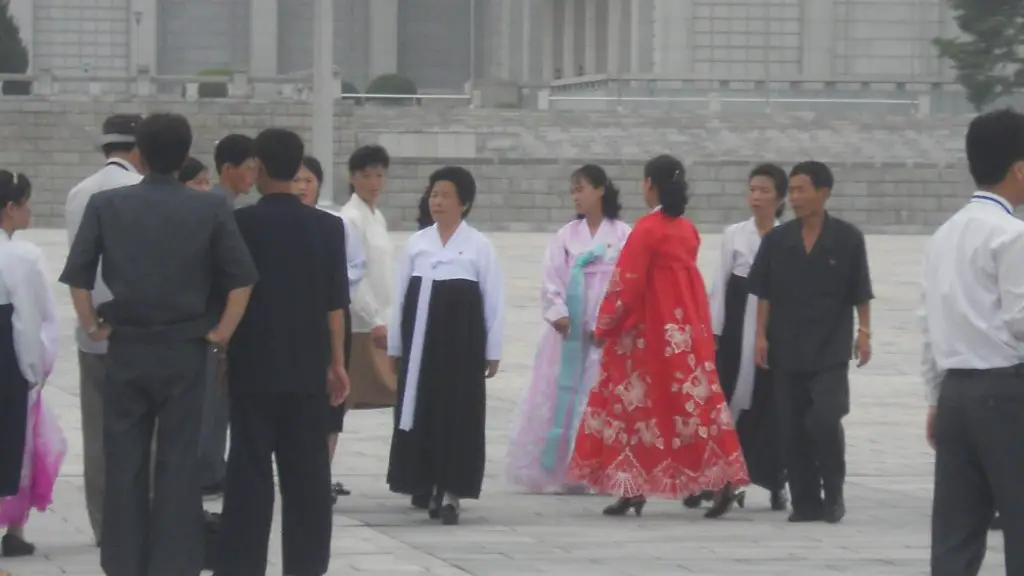For the people of North Korea, accessing internet is one of the most complicated and restricted activities. While the rest of the world has been able to move rapidly with the invention of the internet, North Korea has kept its own citizen’s internet access severely limited. It’s estimated that there are only about 5,000 websites available in North Korea, compared to the one billion websites the rest of the world has access to. It’s not surprising that North Korea is considered one of the most “offline” countries in the world.
The Internet in North Korea is primarily government-owned and operated, and access to it is tightly monitored and regulated. It’s heavily censored and tightly restricted to contain any ideas and images that could potentially be considered “subversive” by the regime. It’s estimated that less than one percent of North Korea’s population has access to the “real” internet.
Those who do have access to the internet are usually members of the elite — members of the military or government, diplomats, and wealthy business people. They are typically given access to a limited network that contains only a few government-controlled websites and no outside connection. Even the network they have access to has very strict censorship rules and regulations.
Internet access in North Korea is not just restricted on the home front, but abroad as well. Citizens of North Korea have limited ability to access the internet while traveling abroad, as the government requires users to register their devices with the local police station at their destination, and then have them monitored. This limits their freedom to access the outside world and forces them to remain within the confines of the government-controlled network.
The internet is an integral part of our lives, from finding new recipes to buying tickets for a show, or even just talking to friends and family. For the people of North Korea, the government has created an atmosphere of fear and surveillance around the internet, making it a tool for control rather than freedom of expression.
Though the internet has been used in an attempt to spread information about the oppressive regime, the government has managed to keep the populace in the dark on a lot of international news and events, isolating them from the outside world. The North Korean government also maintains strict control over what its citizens can view on the very limited internet they have access to. They tightly monitor the websites, making sure only those approved by the government can be accessed, and anything subversive is filtered out.
The government of North Korea may have the power to control the content of their internet, but they cannot stifle the desire of their people to be a part of the online world. Despite the heavy censorship and restrictions, there are ways citizens can access blocked websites, including through proxies and virtual private networks.
How North Korea Controls Internet Connections
North Korea’s internet infrastructure is mainly controlled by the Korean Central Informatics Bureau (KCI), which is the government’s technology arm. It’s one of the few divisions allowed to purchase equipment from foreign countries, enabling them to control their country’s internet connections. All communication and data transmission has to go through the country’s sole internet service provider, Star JV. They are the only ones with access to the outside internet.
This government agency keeps track of who has access to the internet, slows down connections and filters data. They also employ a variety of tactics to monitor and limit communications, from disabling Wi-Fi and blocking websites to using deep packet inspection (DPI) to censor content. They’re also known to delink websites, preventing them from working properly in North Korea, and using Denial of Service (DoS) attacks to shut down dissident sites.
North Korea is one of a handful of countries that has disconnected itself from the world wide web. All international connections are routed through one channel — Shinwol. This infrastructure was introduced to keep out content that could be perceived as a threat to the Kim Jong-un government, such as news of political dissent and anti-government information. It’s also meant to ensure that North Koreans only have access to official government channels and websites, something that citizens have no control over.
The KCI has also been known to employ tactics such as “honeypot” networks to act as decoy websites that could trick users into giving up their personal information. They have also been known to redirect users to websites they may not be expecting, providing outdated information in an attempt to control the narrative North Koreans are able to get access to.
On top of all this, there is an extensive cyber warfare wing in North Korea that is speculated to be responsible for stealing information from other countries and organisations. It’s also been responsible for distributed denial-of-service (DDoS) attacks against a variety of countries in the past. All of these tactics are used by the North Korean government to maintain control over the internet within their country, ensuring that citizens are only seeing what the regime wants them to see.
How North Korean Citizens Access the Internet
Though the majority of North Korean citizens are denied access to the internet, they still manage to find ways to access content online. This can range from smuggling of digital devices outside the country, to using Wi-Fi hotspots in border towns within North Korea.
The most common way for North Koreans to access the internet is through prepaid USBs that are used to connect to an underground network known as Kwangmyong. Kwangmyong has become the de facto “internet” in North Korea, and contains a variety of local websites and services, as well as user-created content.
Access to this network is expensive and often unreliable, but it is still much more affordable compared to international mobile networks, and is tailored to the needs of the North Korean population. It’s estimated that millions of North Koreans use it as a source of information, entertainment, and communication.
Kwangmyong is most used by those living near the borders of North Korea, particularly in cities like Dandong, China, and Pyongyang. The country’s borders are full of makeshift markets that offer digital devices, CDs, DVDs, and USBs containing digital content.
The North Korean government also encourages its citizens to use digital platforms such as a North Korean version of Facebook, called Naenara, that seems to be heavily monitored by the government for any “subversive activity”. All of these sources of information can be useful for North Koreans, but due to the government’s tight control, it is hard to verify the reliability of the content on these sites.
Consequences of Restricting the Internet
The internet has the power to bind nations and can be a valuable source of information, entertainment, and education. But when the internet is used as a tool of repression, it can lead to censorship and unuttered fear.
The internet in North Korea serves as a vehicle of control. By restricting freedom of speech and expression online, the government is able to limit what its citizens can be exposed to, and consequently control the narrative. This isolation from the rest of the world has had a detrimental effect on North Korean citizens, preventing them from accessing important resources and knowledge, and even threatening their safety in some cases.
The North Korean government also uses the internet to track down dissidents and spread propaganda. The KCI has been accused of using malicious software and phishing scams to spy on and track down those who speak out against the government. They also use the internet to spread false information and propaganda about the government.
The internet can also be a source of danger for North Korean citizens. The lack of online security and privacy can put citizens at risk of identity theft, online fraud and cyber attacks. In this way, the internet can be used against North Korean citizens to steal their personal information and put them in danger.
International Efforts To Help North Korea
Despite the heavy restrictions on the internet, there have been some attempts to bring freedom of information to the people of North Korea. Organizations such as Freedom Factory, and the New York-based non-profit Human Rights in North Korea, are committed to providing North Koreans with the tools and resources needed to access the internet and get a glimpse of the outside world.
The Foundation for Connecting North Korean Citizens to the Internet has also stepped in to help North Korean citizens gain access to the internet. They have created programs designed to train North Koreans in internet technology and bring them up to date on the latest news and events from around the world.
To further help North Koreans access the internet, the South Korean government is attempting to set up free Wi-Fi hotspots across the Korean border. They are also attempting to set up information centers that would provide North Korean citizens with the tools and resources they need to navigate the internet.
The U.S. State Department has also been looking into ways to help North Koreans gain access to the internet by offering scholarships to send North Koreans to the U.S. for education and training in internet technology.
These efforts are all aimed at helping to bridge the information divide between North and South Korea, as well as helping to bring North Korean citizens the tools and resources they need to access the internet safely and securely.
Conclusion
The internet can be a powerful tool for freedom of information and expression, but in North Korea, it is a tool of repression. It is heavily monitored and controlled in order to stifle any dissent or anti-government content. It is also restricted abroad to prevent North Koreans from accessing the outside world.
Though it is hard to make an impact in a country that has such tight control over their citizens, there are still organizations and governments attempting to provide North Koreans with the tools and resources to access the internet safely and securely. With these efforts, it is hopeful that one day North Koreans will be able to experience the same level of freedom and access that the rest of the world has been afforded.





